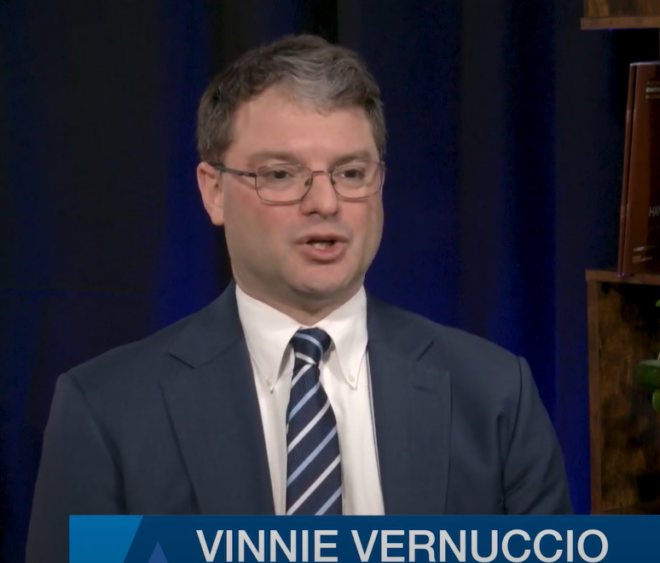Posts tagged Rick Allen

Vincent Vernuccio What is the Employee Rights Act, and would it be a great move for America
July 7, 2025 // "big kudos to Representative Rick Allen from Georgia, who introduced it last week. This is quite simply the most comprehensive pro-worker legislation of this Congress. It protects workers' right to a secret ballot. It protects their choice in right-to-work states if they want to be under a union contract or not. It protects their privacy. It gives them the choice of whether or not to fund union politics. It protects independent workers, the franchise industry, American workers, and multiple other things.
Congressman Allen Introduces the Employee Rights Act of 2025
June 27, 2025 // "With Republicans leading the way, our economy is booming like never before—but our federal labor laws are stuck in the past," said Chairman Walberg. "After years of Biden-Harris efforts to manipulate labor laws to favor activists and union leaders, we need updated policies that protect workers’ independence and interests in today’s evolving workforce. The Employee Rights Act is another strong step in reversing policies that undermine workers’ independence and fail to hold union leadership accountable to their members. I will always support giving workers the right to choose their own path to success." "The Employee Rights Act is the most comprehensive labor legislation of this Congress, from protecting the secret ballot and unionization elections, to safeguarding workers from harassment and protecting their privacy, to putting workers in control of their own destiny. It truly puts the American worker first. We applaud Representative Allen for his steadfast leadership and support of worker freedom," said F. Vincent Vernuccio, President of the Institute for the American Worker.
Georgia Rep Introduces Bill To ‘Empower Workers’ Against Unions
June 27, 2025 // Representative Rick Allen (R-GA) introduced the Employee Rights Act (ERA) of 2025 on Thursday, seeking to reform labor unions and support workers’ rights. The legislation, Allen claims, will provide privacy for unionized workers, allow workers to opt out of union representation, and harmonize existing labor laws. Allen collaborated with F. Vincent Vernuccio – the president and co-founder of labor advocacy group Institute for the American Worker (I4AW) – to write an op-ed in the Washington Examiner explaining his bill.
House Committee Debates NLRB’s Fairness and Transparency
June 18, 2025 // Also at issue was how workers vote for or against unionization. When workers select a union, said Vincent Vernuccio, president of the Institute for the American Worker, they should be allowed to make that choice “securely and privately” and “without intimidation or coercion.” He cited the “true language” of the NLRA that says a “union must be chosen by the majority of all the employees in a unit.” Vernuccio advocated for the use of secret-ballot elections in place of card check, an organizing method in which a union gathers worker signatures.

Commentary: Workers Need More Transparency from Unions
June 5, 2025 // We’re not labor experts or lawyers. We’re too busy doing our day jobs. Unions should be required to disclose a lot more information. Things such as who funds unionization drives, which other unions or groups they’re affiliated with, and whether they’re paying workers to push unionization. This information could have changed the outcome at my old Trader Joe’s store. The best system would equip workers with the facts well before they’re expected to vote. If workers unionize, unions should be required to more regularly provide some of this timely information. Additionally, the Department of Labor should publish the data more often and in a more user-friendly format. For instance, at my old store, we didn’t know that the union officers would be taking salaries from the union — we only found out 18 months later, and we had never agreed to them, which upset many of my co-workers who had supported unionization.
Walberg, Allen Seek Feedback on Path to Give Rank-And-File Workers a Bigger Voice in Unions
May 28, 2025 // “Too often, rank‑and‑file workers lack the timely information and meaningful voice they need to hold elected leaders accountable for both fiscal and political decisions. Recent misconduct cases, ranging from embezzlement to unauthorized political expenditures, underscore the need for a modernized framework that prioritizes the rights of individual members to hold union leadership accountable and that provides individual union members with more control over how labor organizations operate.”
Walberg, Allen Demand Answers on Union Failures to Protect Workers’ Sensitive, Personal Info
May 8, 2025 // The National Labor Relations Board requires that unions receive personal information for the purpose of communicating with workers who are eligible voters in a union election. This information includes individuals’ full names, work locations, shifts, job classifications, home addresses, personal email addresses, and personal cell phone numbers. In order to ensure the union is taking the necessary steps to protect the employee data it collects and to assess whether all this data is necessary, the Committee requests that you provide the following information no later than May 22, 2025
Hearing Recap: “Investing for the Future: Honoring ERISA’s Promise to Participants”
May 3, 2025 // The Health, Employment, Labor, and Pensions Subcommittee held a hearing examining the Employee Retirement Income Security Act (ERISA) and the Left’s efforts to manipulate ERISA plans to push a radical political agenda. These benefit plans hold an estimated $14 trillion in assets and benefit 156 million workers, retirees, and dependents.
GOP lawmakers demand info on Biden-era spending used to declare student-athletes as employees
March 3, 2025 // While the change in how college athletes are treated has been welcomed by many, others have been concerned about the move's potential implications. Earlier this month, the Trump administration rescinded the Biden administration NLRB's September 2021 memo insisting college athletes be recognized as employees under federal labor laws. The Trump administration this month also revoked guidance issued by President Joe Biden on his way out of the White House that required schools to distribute direct NIL payments equally to female and male athletes. Aaron Withe, an expert in government unionization and a former college athlete, said he fears continued momentum toward viewing college athletes as strictly employees will destroy college sports. "Are unions going to step in between a coach and their athletes for yelling at the players, or because practice went long or because they're making them run an exceptional amount of lines?" Withe wondered. "If you're represented by a union, they're now your bargaining agent. You have no ability to go represent yourself in anything with the university if it is deemed they are your employer. You've got no ability to go negotiate with them anymore."
Walberg, Allen to NLRB: How Much Taxpayer Money Did Biden-Harris Spend Trying to Unionize Student Athletes
March 2, 2025 // “In September 2021, General Counsel Abruzzo issued a memorandum to NLRB field offices taking a ‘prosecutorial position’ that certain student-athletes were employees under the NLRA. The memo further stated she would pursue an independent violation of NLRA Section 8(a)(1) in ‘appropriate’ cases where an employer misclassified players as student-athletes rather than as employees.” The letter continues: “General Counsel Abruzzo’s attempts to impose the Biden-Harris administration’s misguided priorities on the student-athlete population would have caused significant consequences. Student-athletes would have lost the ability to negotiate their own deals with universities, and classifying these student-athletes as employees could have hindered their ability to transfer between schools.
